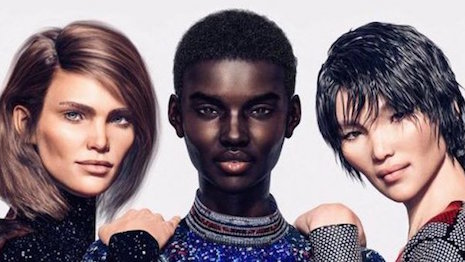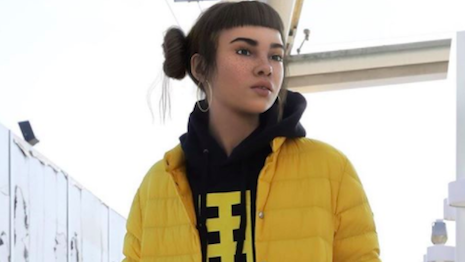- About
- Subscribe Now
- New York,
April 24, 2019

 Balmain’s latest CGI models Margot (left) and Zhi (right), together with Shudu Gram. Image credit: Balmain
Balmain’s latest CGI models Margot (left) and Zhi (right), together with Shudu Gram. Image credit: Balmain
By Abhay Gupta
Meet “Lil Miquela,” a Brazilian-Spanish virtual influencer, Instagram model and music artist claiming to be from Downey, California.
Lil Miquela, full name Miquela Sousa, is the latest in the world of social media influencer marketing.
Since 2016, Lil Miquela has picked up quite a fan following with more than 1.5 million followers on Instagram.
The biggest draw for fans and brands to such influencers?
Miquela does not exist.
Well, not in the real-world sense.
Lil Miquela is a fictional digital character and a digital art project that began in 2016. Over the years, she has engaged with fans using her digital presence across social media channels sharing stories as she goes on and about with her daily digital life.
Lil Miquela is not alone.
 Moncler tapped Lil Miquela for its Genius effort. Image credit: Moncler
Moncler tapped Lil Miquela for its Genius effort. Image credit: Moncler
Real presence
Another digital influencer created by The Diigitals, Shudu Gram is considered to be the world’s first digital model.
There are already digital startups working on creating an entire fleet of such virtual influencers complete with individual personas, preferences and dislikes, virtual lives and life events for drama.
A recent life event included an account hack by a fellow digital influencer that created a social media sensation.
Today, several digital influencers exist from various backgrounds offering their services as influencers for top brands.
Lil Miquela and other such influencers are not the first of their kind, per se.
Purely in terms of digital influence by a fake group or character, various characters have been used time and again for brand marketing and endorsements.
Fido Dido was a character created for a 7 Up commercial who also has his own social media channels. There are other cartoon characters that come to mind as well.
However, the one group that comes close to the concept of digital influence based on entire personas with the creators being anonymous or hidden from popularity is British virtual band “Gorillaz” that was created in 1998 by musician Damon Albarn and artist Jamie Hewlett.
The band primarily consists of four animated members: 2D, Murdoc Niccals, Noodle and Russel Hobbs. Fans got to become a part of their fictional universe via music videos, interviews and other short cartoons released over the years.
Gorillaz has an online presence and has endorsed or partnered with several brands for promotions as well.
Just as in the case of Gorillaz, the modern-day virtual influencers have an entire profile complete with causes they associate with, people they follow, their followers and, needless to say, brands and products they endorse.
There are social causes that the digital influencers associate with, charities they donate to, movements they support and are even aware of the latest events and hence address them on their social channels. This allows the digital influencers to live a more real “digital life” and better connect with like-minded fans and followers.
At the onset, brands did worry on the efficacy and abilities of digital influencers to actually “influence” their followers as real-world influencers are able.
The large fan followings and thousands of likes, comments, and tweets per post have since eliminated any such concerns.
Choice dilemma: Real or fake influencer
A core concern that digital influencers eliminate for brands is the issue of the real brand ambassadors and associated influencers getting involved in scandals that may lead to negative publicity.
For example, if a brand ambassador or an associated social media influencer gets involved in a scandal that leads to a public outcry, the negative media attention on the brand is highly risky for the brand’s image and for its stock value.
Cleaning the brand’s image post-scandal then becomes a major concern combined with the legal hassles of disassociating with the influencer or the brand’s image.
Various such examples exist where actions of real-world influencers have caused concerns and created trouble for the associated brands.
Digital influencers are controlled by entities that have created them. Generally, such digital entities have a large team of creators involved and due processes that eliminate any chances of wrongdoings from a virtual influencer.
The creation of virtual personas solely for the purpose of promoting brands highlights the shift towards the new trend.
It is easy to see why a number of brands have already associated with Lil Miquela, Shudu, Margot and other virtual influencers.
The primary operative model is on similar lines as with real social media influencers, however, in a more controlled environment.
Additionally, working with a virtual influencer is a lot easier because of various logistics issues being eliminated.
Celebrities may not be available on the days that the brands may need them for a shoot.
At the same time, the angles, the colors and the imagery are a lot easier to manage since all of it in any case is created from scratch. So there is more control on how the end visual should look like – something that may not be possible with real-world influencers where a lot of post-production is required to get the desired results.
However the key benefit from using virtual influencers is the target demographic. One can always create new influencers to target specific audience demographics.
Lil Miquela has a huge fan following from millennials and Gen Z. Creators can similarly create further influencers who are age-similar, and have specific looks and background stories that target specific demographics, immediately attracting more followers made of the specific audience they need. So it becomes a win-win for the brands and the creators of the influencers.
WHETHER THIS is just a trend or a long-term winner remains to be seen.
However, what stands true for now is the fact that there already are several virtual influencers filling the digital world with their influence, have millions in followers and are going viral by the day, and top brands are already lining up to have their products endorsed.
 Abhay Gupta is founder/CEO of Luxury Connect and Luxury Connect Business School
Abhay Gupta is founder/CEO of Luxury Connect and Luxury Connect Business School
Abhay Gupta is founder/CEO of Luxury Connect and Luxury Connect Business School, Gurgaon, Haryana, India. Reach him at abhay@luxuryconnect.in.
Share your thoughts. Click here